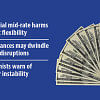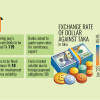Forex freedom or illusion? Bangladesh is caught in a currency conundrum

Bangladesh's central bank has officially allowed banks to trade foreign currency at market rates, but the so-called "free" market remains quietly tethered by unseen controls.
An unofficial mid-rate set by the central bank is causing headaches for bankers, who say it's more of a leash than a guide. While the move toward a flexible exchange rate was meant to liberalise the forex market, nudged by the International Monetary Fund, it's instead stirring confusion and complaints.
The central bank's tight grip has driven the dollar's mid-rate from Tk 117 to Tk 119 per dollar by the end of 2024, sparking debates. Officially, banks are quoting around Tk 122 per dollar for transactions, but insiders say real market rates are higher, sometimes reaching as much as Tk 128. This mismatch is causing ripple effects. Importers are resorting to shady workaround systems, remittance flows risk declining, and banks are grappling with shrinking profit margins under rigid regulations.
State-owned banks are feeling the pinch the most, prompting the central bank to pressure exchange houses to prioritise them for dollar sales. But critics warn this could backfire, pushing more remittance flows to informal channels like the hundi system.
Economists argue the solution is simple: let the market do its thing. Free-floating the exchange rate, they say, would narrow the gap between official and black-market rates, boost remittance inflows, and stabilise the forex market. Until then, it's a game of reform versus restriction -- and no one's winning.

 For all latest news, follow The Daily Star's Google News channel.
For all latest news, follow The Daily Star's Google News channel. 





Comments